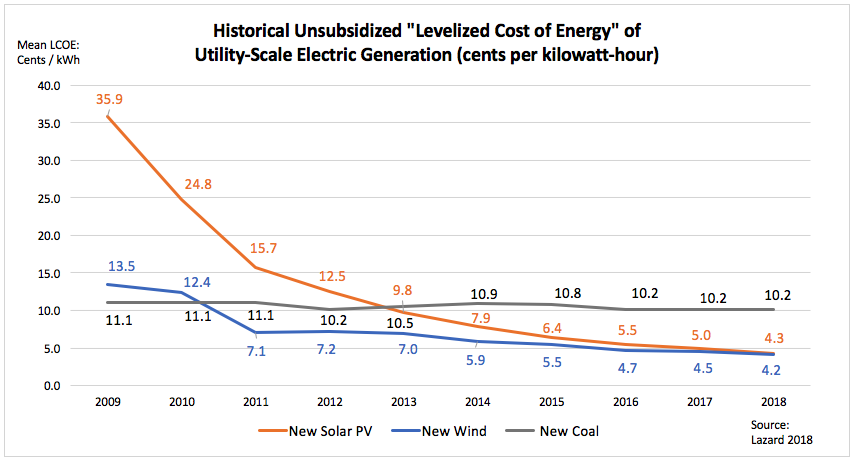Yesterday, Wisconsin Manufacturers and Commerce President Kurt Bauer issued a statement regarding Wisconsin Governor Tony Evers’ pledge to join an effort to reduce Wisconsin’s carbon emissions in accordance with the goals of the “Paris Climate Accord.” Regardless of your position on climate change or the Paris Climate Accord, Mr. Bauer’s assertions about the economics of reducing carbon emissions are based on outdated math, especially as it relates to the price of electricity and switching to renewable energy.
Since 2009, the cost of delivered electricity from new wind energy farms has declined 69%, and the cost of delivered electricity from new utility-scale solar farms has declined 88%.
In their “Levelized Cost of Energy Version 12.0,” (available here) released in November 2018 by Lazard, a respected international finance company, the numbers about the unsubsidized cost of renewable energy are plainly spelled out.
Furthermore, a recent open bidding process in Colorado resulted in dozens of wind, solar, and battery storage proposals. Selecting the lowest-cost set of projects, Colorado policymakers and the utility were able to identify a set of projects that replaced existing coal generation while saving ratepayers $213 million to $374 million. (Source: Greentech Media)
Major Wisconsin utilities are currently pursuing their own least-cost pathway to future electric generation, and it involves shutting down older, less-efficient, and more costly coal plants while reinvesting in new wind and solar generation. Why? In their own words, it will save their customers money.
Just yesterday, in its quarterly earnings call, WEC Energy Group, which produces about half of the electricity used in Wisconsin, Executive Chairman Gale Klappa said “[W]e made real progress in reducing our carbon dioxide emissions. In fact, we are on track to exceed our goal of 40% reduction below 2005 levels by the year 2030. Now we expect to achieve that goal by 2023.”
The times have changed, and Wisconsin Manufacturer & Commerce’s math is outdated. Corporate America, including some of Wisconsin’s best job creators and industries of the future, are investing in renewable energy, saving money, and creating jobs.
Instead of just saying no, we would encourage WMC and its members to work with the renewable energy industry, electricity providers, Governor Evers, and the Legislature to pursue cost effective ways to take advantage of the new economics and technology advances in renewable energy. Renewable energy is now a job-creating and money-saving opportunity for its members and all businesses across Wisconsin.

